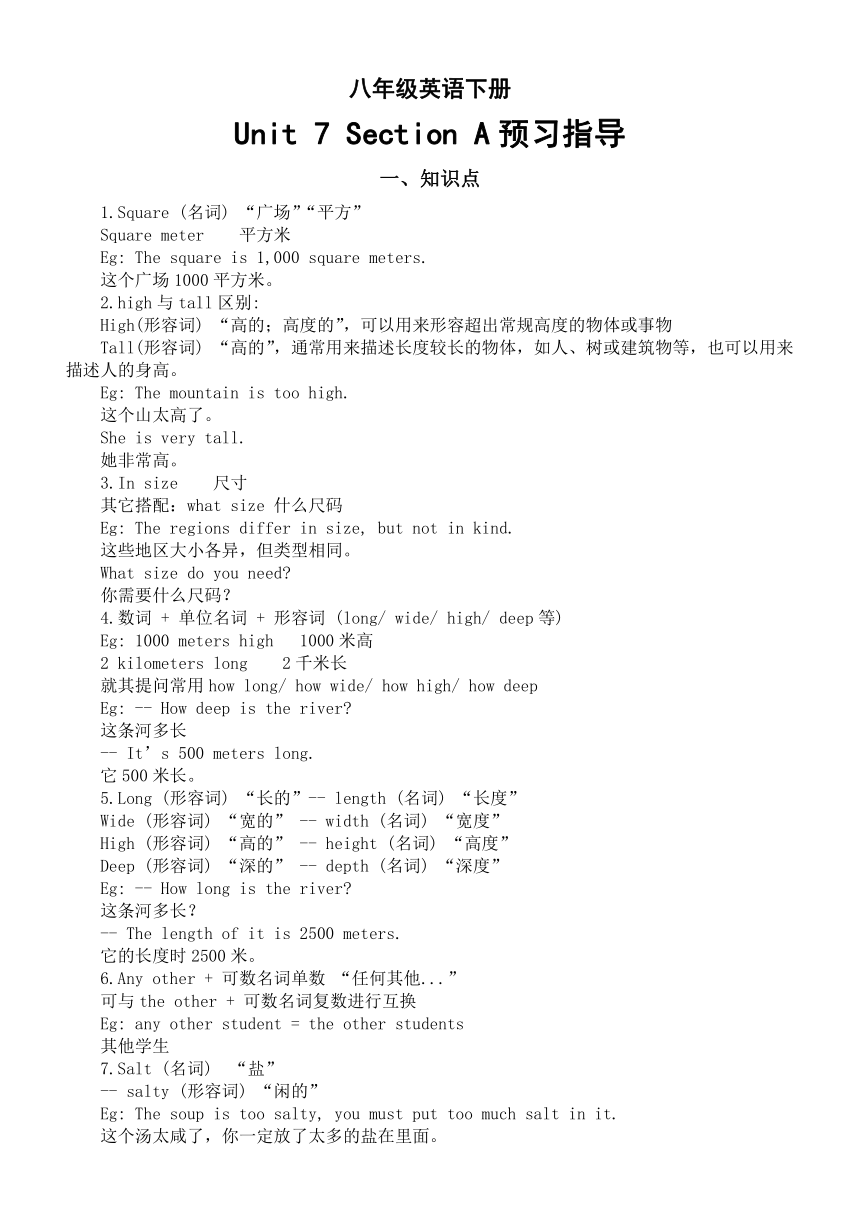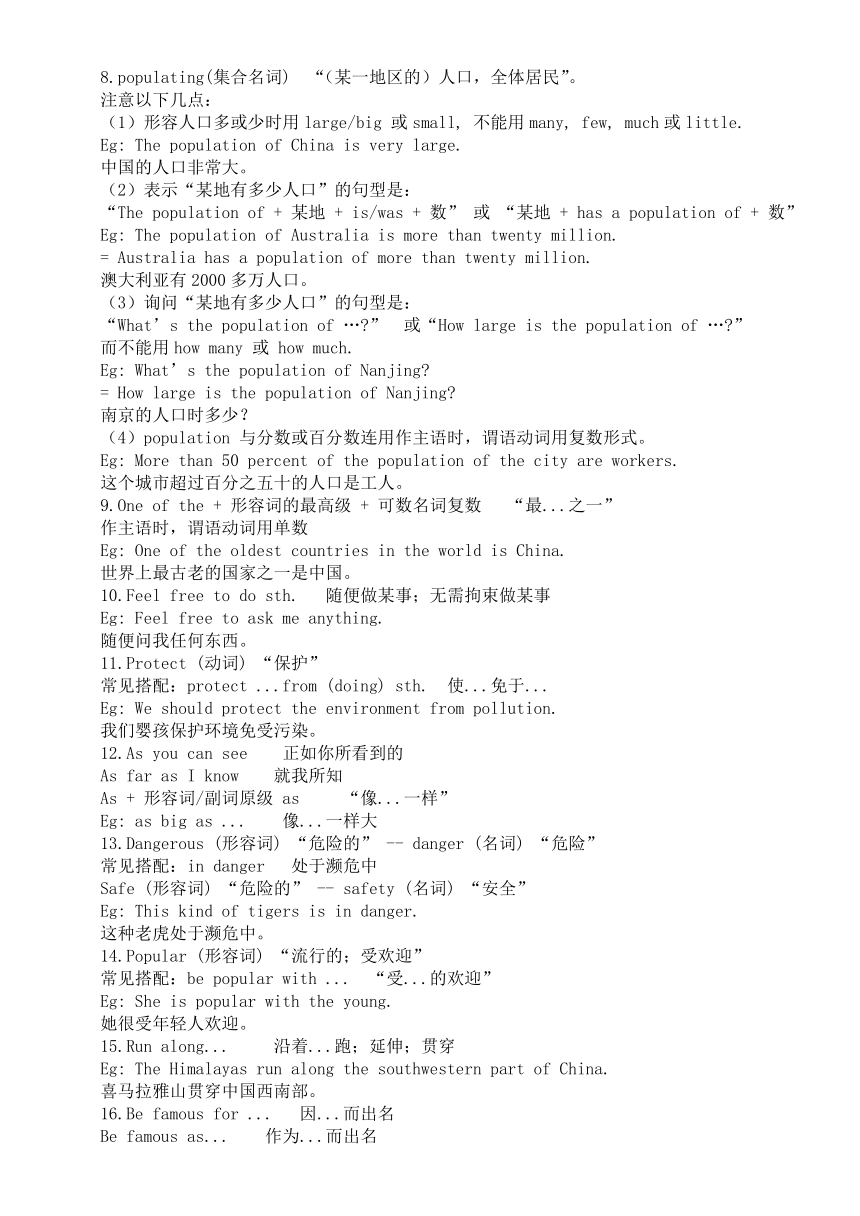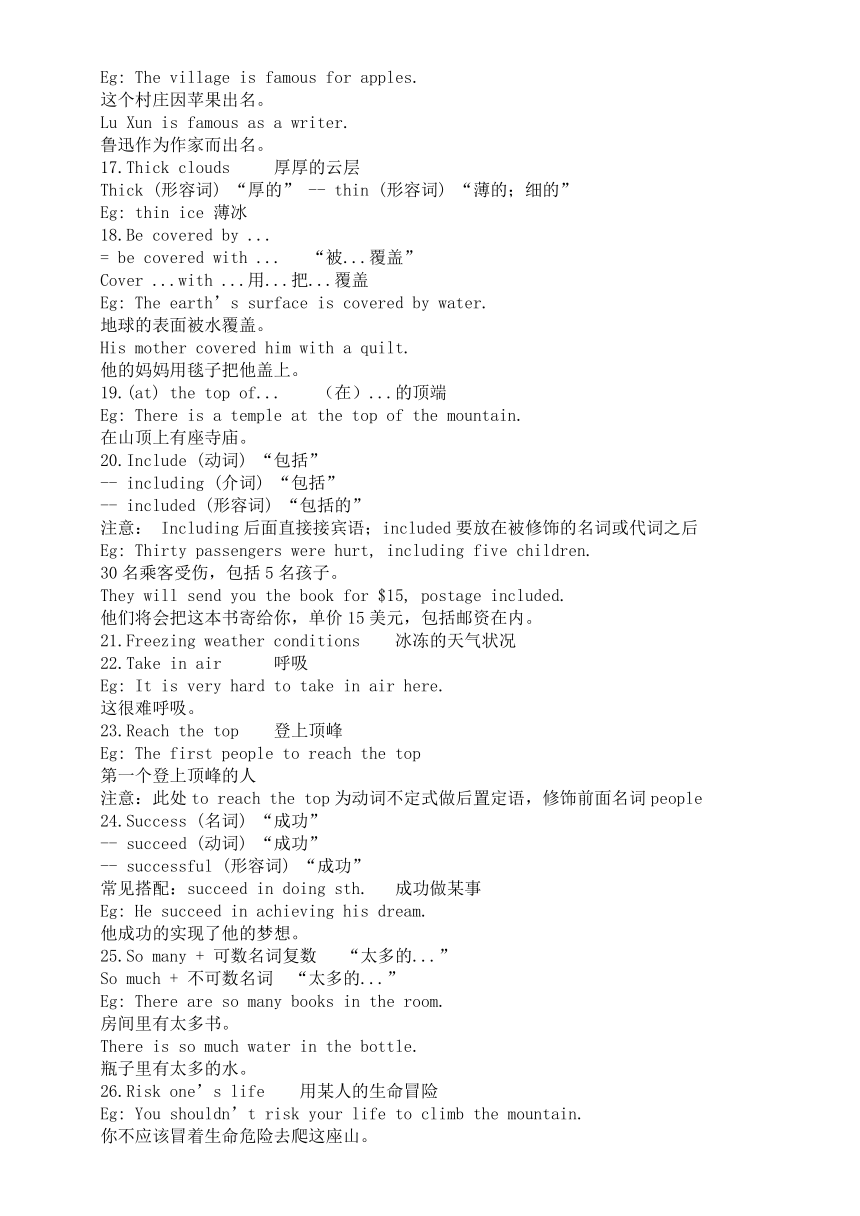人教版八年级下册Unit 7 What's the highest mountain in the world?Section A预习指导(知识点+练习题)(含答案)
文档属性
| 名称 | 人教版八年级下册Unit 7 What's the highest mountain in the world?Section A预习指导(知识点+练习题)(含答案) |  | |
| 格式 | docx | ||
| 文件大小 | 36.4KB | ||
| 资源类型 | 教案 | ||
| 版本资源 | 人教新目标(Go for it)版 | ||
| 科目 | 英语 | ||
| 更新时间 | 2024-04-17 13:01:07 | ||
图片预览



文档简介
八年级英语下册
Unit 7 Section A预习指导
一、知识点
1.Square (名词) “广场”“平方”
Square meter 平方米
Eg: The square is 1,000 square meters.
这个广场1000平方米。
2.high与tall区别:
High(形容词) “高的;高度的”,可以用来形容超出常规高度的物体或事物
Tall(形容词) “高的”,通常用来描述长度较长的物体,如人、树或建筑物等,也可以用来描述人的身高。
Eg: The mountain is too high.
这个山太高了。
She is very tall.
她非常高。
3.In size 尺寸
其它搭配:what size 什么尺码
Eg: The regions differ in size, but not in kind.
这些地区大小各异,但类型相同。
What size do you need
你需要什么尺码?
4.数词 + 单位名词 + 形容词 (long/ wide/ high/ deep等)
Eg: 1000 meters high 1000米高
2 kilometers long 2千米长
就其提问常用how long/ how wide/ how high/ how deep
Eg: -- How deep is the river
这条河多长
-- It’s 500 meters long.
它500米长。
5.Long (形容词) “长的”-- length (名词) “长度”
Wide (形容词) “宽的” -- width (名词) “宽度”
High (形容词) “高的” -- height (名词) “高度”
Deep (形容词) “深的” -- depth (名词) “深度”
Eg: -- How long is the river
这条河多长?
-- The length of it is 2500 meters.
它的长度时2500米。
6.Any other + 可数名词单数 “任何其他...”
可与the other + 可数名词复数进行互换
Eg: any other student = the other students
其他学生
7.Salt (名词) “盐”
-- salty (形容词) “闲的”
Eg: The soup is too salty, you must put too much salt in it.
这个汤太咸了,你一定放了太多的盐在里面。
8.populating(集合名词) “(某一地区的)人口,全体居民”。
注意以下几点:
(1)形容人口多或少时用large/big 或small, 不能用many, few, much或little.
Eg: The population of China is very large.
中国的人口非常大。
(2)表示“某地有多少人口”的句型是:
“The population of + 某地 + is/was + 数” 或 “某地 + has a population of + 数”
Eg: The population of Australia is more than twenty million.
= Australia has a population of more than twenty million.
澳大利亚有2000多万人口。
(3)询问“某地有多少人口”的句型是:
“What’s the population of … ” 或“How large is the population of … ”
而不能用how many 或 how much.
Eg: What’s the population of Nanjing
= How large is the population of Nanjing
南京的人口时多少?
(4)population 与分数或百分数连用作主语时,谓语动词用复数形式。
Eg: More than 50 percent of the population of the city are workers.
这个城市超过百分之五十的人口是工人。
9.One of the + 形容词的最高级 + 可数名词复数 “最...之一”
作主语时,谓语动词用单数
Eg: One of the oldest countries in the world is China.
世界上最古老的国家之一是中国。
10.Feel free to do sth. 随便做某事;无需拘束做某事
Eg: Feel free to ask me anything.
随便问我任何东西。
11.Protect (动词) “保护”
常见搭配:protect ...from (doing) sth. 使...免于...
Eg: We should protect the environment from pollution.
我们婴孩保护环境免受污染。
12.As you can see 正如你所看到的
As far as I know 就我所知
As + 形容词/副词原级 as “像...一样”
Eg: as big as ... 像...一样大
13.Dangerous (形容词) “危险的” -- danger (名词) “危险”
常见搭配:in danger 处于濒危中
Safe (形容词) “危险的” -- safety (名词) “安全”
Eg: This kind of tigers is in danger.
这种老虎处于濒危中。
14.Popular (形容词) “流行的;受欢迎”
常见搭配:be popular with ... “受...的欢迎”
Eg: She is popular with the young.
她很受年轻人欢迎。
15.Run along... 沿着...跑;延伸;贯穿
Eg: The Himalayas run along the southwestern part of China.
喜马拉雅山贯穿中国西南部。
16.Be famous for ... 因...而出名
Be famous as... 作为...而出名
Eg: The village is famous for apples.
这个村庄因苹果出名。
Lu Xun is famous as a writer.
鲁迅作为作家而出名。
17.Thick clouds 厚厚的云层
Thick (形容词) “厚的” -- thin (形容词) “薄的;细的”
Eg: thin ice 薄冰
18.Be covered by ...
= be covered with ... “被...覆盖”
Cover ...with ...用...把...覆盖
Eg: The earth’s surface is covered by water.
地球的表面被水覆盖。
His mother covered him with a quilt.
他的妈妈用毯子把他盖上。
19.(at) the top of... (在)...的顶端
Eg: There is a temple at the top of the mountain.
在山顶上有座寺庙。
20.Include (动词) “包括”
-- including (介词) “包括”
-- included (形容词) “包括的”
注意: Including后面直接接宾语;included要放在被修饰的名词或代词之后
Eg: Thirty passengers were hurt, including five children.
30名乘客受伤,包括5名孩子。
They will send you the book for $15, postage included.
他们将会把这本书寄给你,单价15美元,包括邮资在内。
21.Freezing weather conditions 冰冻的天气状况
22.Take in air 呼吸
Eg: It is very hard to take in air here.
这很难呼吸。
23.Reach the top 登上顶峰
Eg: The first people to reach the top
第一个登上顶峰的人
注意:此处to reach the top为动词不定式做后置定语,修饰前面名词people
24.Success (名词) “成功”
-- succeed (动词) “成功”
-- successful (形容词) “成功”
常见搭配:succeed in doing sth. 成功做某事
Eg: He succeed in achieving his dream.
他成功的实现了他的梦想。
25.So many + 可数名词复数 “太多的...”
So much + 不可数名词 “太多的...”
Eg: There are so many books in the room.
房间里有太多书。
There is so much water in the bottle.
瓶子里有太多的水。
26.Risk one’s life 用某人的生命冒险
Eg: You shouldn’t risk your life to climb the mountain.
你不应该冒着生命危险去爬这座山。
27.One of the main reasons is ... 主要原因之一是...
Eg: One of the main reasons is that people want to challenge themselves in the face of difficulties.
主要原因之一是人们想在面对困难时挑战自己。
28.Challenge oneself 挑战自己
Eg: You are so brave that you can challenge yourself.
你如此勇敢以至于你可以挑战你自己。
29.In the face of difficulties
= face the difficulties
在面对困难时
30.Face (名词) “脸” (动词) “面对”
Face to face 面对面
Eg: She has a round face.
她长了一张圆脸。
31.Difficulty (名词) “困难” -- difficult (形容词) “困难的”
Have difficulties doing sth. 做某事有困难
Eg: She is so young that she has difficulties looking after herself.
她如此小以至于在照顾她自己方面有困难。
32.give up doing sth. 放弃做某事
Eg: Don’t give up chasing your dream.
不要放弃追逐你的梦想。
33.Achieve one’s dreams 实现某人梦想 (主语为人)
Achieve (动词) “实现” -- achievement (名词) “实现”
Come true “实现” (主语为梦想)
Eg: We will achieve our dreams if we keep working hard.
= Our dreams will come true if we keep working hard.
只要我们一直努力工作就一定能实现梦想。
34.Force (名词) “力;力量” (动词) “强迫”
Force sb.to do sth. 强迫某人做某事
Eg: Please don’t force me to do something I don’t like.
请不要强迫我作我不喜欢的事。
二、练习题
一、根据句意及首字母或汉语提示完成单词
1.Our school is only 100 s______ kilometers.
2.What is the ________ (人口) of your hometown
3.You must a_______ your dream one day.
4.These poor children keep studying in the bad ________ (条件).
5.Your must p_______ yourself when you are out alone.
二、用所给词的适当形式填空
1.You must be careful in ________ (freeze) weather.
2.They are proud of their son’s ________ (achieve).
3.She always has ________ (difficult) in learning maths.
4.Lu Xun is a ________ (success) writer.
5.The ground is _______ (cover) with snow.
三、单项选择
( )1.-- ______ is the river
-- It’s about 3000 kilometers.
A.How big
B.How far
C.How high
D.How long
( )2.The sunglasses can _____ your eyes ______ strong sunlight.
A.protect; from
B.protect; in
C.protect; away
D.protect; out
( )3._______ we know, China is getting stronger and stronger.
A.As far as
B.As long as
C.As soon as
D.As often as
( )4.There are many books in the library, ______ Mo Yan’s books.
A.include
B.to include
C.including
D.included
( )5.It’s very difficult to _____ air on the top of high mountains over 4000 meters.
A.take in
B.take away
C.take up
D.take out
四、翻译句子
1.我们的房子6米宽20米长。
Our house is about 6 ______ ______, 20 ______ _____.
2.珠穆朗玛峰比世界上任何其它的山高。、
Qomolangma is _____ _____ _____ _____ mountain in the world.
3.就我所知,没有人能回答这个问题。
_____ _____ ____ _____ _____, there is no one who can answer this question.
4.随便问我任何问题。
_____ ______ _____ _____ me anything.
5.中国的人口是多少?
_____ ______ _____ _____ ______
五、补全对话
A: Julia, would you mind coming here I need some help.
B: Certainly not.I’m coming right now.1.______
A: You see.I have so much housework to do in the kitchen.
B: 2._______
A: Of course, and you have to help me make dinner.
B: All right.When I finish, could you help me with my homework
A: Your homework 3._______
B: No, I haven’t.It’s too difficult for me.
A: 4.______
B: Since breakfast.
A: You know, I can’t help you.I’ll have to do some shopping after lunch.
B: But what should I do with my homework
A: I think you’d better make a telephone call to your friend, Mary.5.______
B: OK.That sounds a good idea.Thank you all the same.
A: You are welcome.
A.I think she can help you with it.
B.How long have you been doing your homework
C.What is the matter with your homework
D.What can I do for you
E.Haven’t you finished it
F.Do you have to wash the dishes
附:参考答案
一、1.square 2.population 3.achieve 4.condition 5.protect
二、1.freezing 2.achievement 3.difficulties 4.successful 5.covered
三、1 -- 5 DAACA
四、1.meters wide; meters long
2.Higher than any other
3.As far as I know
4.Feel free to ask
5.What’s the population of China
五、1 -- 5 DFEBA
Unit 7 Section A预习指导
一、知识点
1.Square (名词) “广场”“平方”
Square meter 平方米
Eg: The square is 1,000 square meters.
这个广场1000平方米。
2.high与tall区别:
High(形容词) “高的;高度的”,可以用来形容超出常规高度的物体或事物
Tall(形容词) “高的”,通常用来描述长度较长的物体,如人、树或建筑物等,也可以用来描述人的身高。
Eg: The mountain is too high.
这个山太高了。
She is very tall.
她非常高。
3.In size 尺寸
其它搭配:what size 什么尺码
Eg: The regions differ in size, but not in kind.
这些地区大小各异,但类型相同。
What size do you need
你需要什么尺码?
4.数词 + 单位名词 + 形容词 (long/ wide/ high/ deep等)
Eg: 1000 meters high 1000米高
2 kilometers long 2千米长
就其提问常用how long/ how wide/ how high/ how deep
Eg: -- How deep is the river
这条河多长
-- It’s 500 meters long.
它500米长。
5.Long (形容词) “长的”-- length (名词) “长度”
Wide (形容词) “宽的” -- width (名词) “宽度”
High (形容词) “高的” -- height (名词) “高度”
Deep (形容词) “深的” -- depth (名词) “深度”
Eg: -- How long is the river
这条河多长?
-- The length of it is 2500 meters.
它的长度时2500米。
6.Any other + 可数名词单数 “任何其他...”
可与the other + 可数名词复数进行互换
Eg: any other student = the other students
其他学生
7.Salt (名词) “盐”
-- salty (形容词) “闲的”
Eg: The soup is too salty, you must put too much salt in it.
这个汤太咸了,你一定放了太多的盐在里面。
8.populating(集合名词) “(某一地区的)人口,全体居民”。
注意以下几点:
(1)形容人口多或少时用large/big 或small, 不能用many, few, much或little.
Eg: The population of China is very large.
中国的人口非常大。
(2)表示“某地有多少人口”的句型是:
“The population of + 某地 + is/was + 数” 或 “某地 + has a population of + 数”
Eg: The population of Australia is more than twenty million.
= Australia has a population of more than twenty million.
澳大利亚有2000多万人口。
(3)询问“某地有多少人口”的句型是:
“What’s the population of … ” 或“How large is the population of … ”
而不能用how many 或 how much.
Eg: What’s the population of Nanjing
= How large is the population of Nanjing
南京的人口时多少?
(4)population 与分数或百分数连用作主语时,谓语动词用复数形式。
Eg: More than 50 percent of the population of the city are workers.
这个城市超过百分之五十的人口是工人。
9.One of the + 形容词的最高级 + 可数名词复数 “最...之一”
作主语时,谓语动词用单数
Eg: One of the oldest countries in the world is China.
世界上最古老的国家之一是中国。
10.Feel free to do sth. 随便做某事;无需拘束做某事
Eg: Feel free to ask me anything.
随便问我任何东西。
11.Protect (动词) “保护”
常见搭配:protect ...from (doing) sth. 使...免于...
Eg: We should protect the environment from pollution.
我们婴孩保护环境免受污染。
12.As you can see 正如你所看到的
As far as I know 就我所知
As + 形容词/副词原级 as “像...一样”
Eg: as big as ... 像...一样大
13.Dangerous (形容词) “危险的” -- danger (名词) “危险”
常见搭配:in danger 处于濒危中
Safe (形容词) “危险的” -- safety (名词) “安全”
Eg: This kind of tigers is in danger.
这种老虎处于濒危中。
14.Popular (形容词) “流行的;受欢迎”
常见搭配:be popular with ... “受...的欢迎”
Eg: She is popular with the young.
她很受年轻人欢迎。
15.Run along... 沿着...跑;延伸;贯穿
Eg: The Himalayas run along the southwestern part of China.
喜马拉雅山贯穿中国西南部。
16.Be famous for ... 因...而出名
Be famous as... 作为...而出名
Eg: The village is famous for apples.
这个村庄因苹果出名。
Lu Xun is famous as a writer.
鲁迅作为作家而出名。
17.Thick clouds 厚厚的云层
Thick (形容词) “厚的” -- thin (形容词) “薄的;细的”
Eg: thin ice 薄冰
18.Be covered by ...
= be covered with ... “被...覆盖”
Cover ...with ...用...把...覆盖
Eg: The earth’s surface is covered by water.
地球的表面被水覆盖。
His mother covered him with a quilt.
他的妈妈用毯子把他盖上。
19.(at) the top of... (在)...的顶端
Eg: There is a temple at the top of the mountain.
在山顶上有座寺庙。
20.Include (动词) “包括”
-- including (介词) “包括”
-- included (形容词) “包括的”
注意: Including后面直接接宾语;included要放在被修饰的名词或代词之后
Eg: Thirty passengers were hurt, including five children.
30名乘客受伤,包括5名孩子。
They will send you the book for $15, postage included.
他们将会把这本书寄给你,单价15美元,包括邮资在内。
21.Freezing weather conditions 冰冻的天气状况
22.Take in air 呼吸
Eg: It is very hard to take in air here.
这很难呼吸。
23.Reach the top 登上顶峰
Eg: The first people to reach the top
第一个登上顶峰的人
注意:此处to reach the top为动词不定式做后置定语,修饰前面名词people
24.Success (名词) “成功”
-- succeed (动词) “成功”
-- successful (形容词) “成功”
常见搭配:succeed in doing sth. 成功做某事
Eg: He succeed in achieving his dream.
他成功的实现了他的梦想。
25.So many + 可数名词复数 “太多的...”
So much + 不可数名词 “太多的...”
Eg: There are so many books in the room.
房间里有太多书。
There is so much water in the bottle.
瓶子里有太多的水。
26.Risk one’s life 用某人的生命冒险
Eg: You shouldn’t risk your life to climb the mountain.
你不应该冒着生命危险去爬这座山。
27.One of the main reasons is ... 主要原因之一是...
Eg: One of the main reasons is that people want to challenge themselves in the face of difficulties.
主要原因之一是人们想在面对困难时挑战自己。
28.Challenge oneself 挑战自己
Eg: You are so brave that you can challenge yourself.
你如此勇敢以至于你可以挑战你自己。
29.In the face of difficulties
= face the difficulties
在面对困难时
30.Face (名词) “脸” (动词) “面对”
Face to face 面对面
Eg: She has a round face.
她长了一张圆脸。
31.Difficulty (名词) “困难” -- difficult (形容词) “困难的”
Have difficulties doing sth. 做某事有困难
Eg: She is so young that she has difficulties looking after herself.
她如此小以至于在照顾她自己方面有困难。
32.give up doing sth. 放弃做某事
Eg: Don’t give up chasing your dream.
不要放弃追逐你的梦想。
33.Achieve one’s dreams 实现某人梦想 (主语为人)
Achieve (动词) “实现” -- achievement (名词) “实现”
Come true “实现” (主语为梦想)
Eg: We will achieve our dreams if we keep working hard.
= Our dreams will come true if we keep working hard.
只要我们一直努力工作就一定能实现梦想。
34.Force (名词) “力;力量” (动词) “强迫”
Force sb.to do sth. 强迫某人做某事
Eg: Please don’t force me to do something I don’t like.
请不要强迫我作我不喜欢的事。
二、练习题
一、根据句意及首字母或汉语提示完成单词
1.Our school is only 100 s______ kilometers.
2.What is the ________ (人口) of your hometown
3.You must a_______ your dream one day.
4.These poor children keep studying in the bad ________ (条件).
5.Your must p_______ yourself when you are out alone.
二、用所给词的适当形式填空
1.You must be careful in ________ (freeze) weather.
2.They are proud of their son’s ________ (achieve).
3.She always has ________ (difficult) in learning maths.
4.Lu Xun is a ________ (success) writer.
5.The ground is _______ (cover) with snow.
三、单项选择
( )1.-- ______ is the river
-- It’s about 3000 kilometers.
A.How big
B.How far
C.How high
D.How long
( )2.The sunglasses can _____ your eyes ______ strong sunlight.
A.protect; from
B.protect; in
C.protect; away
D.protect; out
( )3._______ we know, China is getting stronger and stronger.
A.As far as
B.As long as
C.As soon as
D.As often as
( )4.There are many books in the library, ______ Mo Yan’s books.
A.include
B.to include
C.including
D.included
( )5.It’s very difficult to _____ air on the top of high mountains over 4000 meters.
A.take in
B.take away
C.take up
D.take out
四、翻译句子
1.我们的房子6米宽20米长。
Our house is about 6 ______ ______, 20 ______ _____.
2.珠穆朗玛峰比世界上任何其它的山高。、
Qomolangma is _____ _____ _____ _____ mountain in the world.
3.就我所知,没有人能回答这个问题。
_____ _____ ____ _____ _____, there is no one who can answer this question.
4.随便问我任何问题。
_____ ______ _____ _____ me anything.
5.中国的人口是多少?
_____ ______ _____ _____ ______
五、补全对话
A: Julia, would you mind coming here I need some help.
B: Certainly not.I’m coming right now.1.______
A: You see.I have so much housework to do in the kitchen.
B: 2._______
A: Of course, and you have to help me make dinner.
B: All right.When I finish, could you help me with my homework
A: Your homework 3._______
B: No, I haven’t.It’s too difficult for me.
A: 4.______
B: Since breakfast.
A: You know, I can’t help you.I’ll have to do some shopping after lunch.
B: But what should I do with my homework
A: I think you’d better make a telephone call to your friend, Mary.5.______
B: OK.That sounds a good idea.Thank you all the same.
A: You are welcome.
A.I think she can help you with it.
B.How long have you been doing your homework
C.What is the matter with your homework
D.What can I do for you
E.Haven’t you finished it
F.Do you have to wash the dishes
附:参考答案
一、1.square 2.population 3.achieve 4.condition 5.protect
二、1.freezing 2.achievement 3.difficulties 4.successful 5.covered
三、1 -- 5 DAACA
四、1.meters wide; meters long
2.Higher than any other
3.As far as I know
4.Feel free to ask
5.What’s the population of China
五、1 -- 5 DFEBA
同课章节目录
- Unit 1 What's the matter?
- Section A
- Section B
- Unit 2 I'll help to clean up the city parks.
- Section A
- Section B
- Unit 3 Could you please clean your room?
- Section A
- Section B
- Unit 4 Why don't you talk to your parents?
- Section A
- Section B
- Unit 5 What were you doing when the rainstorm came
- Section A
- Section B
- Review of Units 1-5
- Unit 6 An old man tried to move the mountains.
- Section A
- Section B
- Unit 7 What's the highest mountain in the world?
- Section A
- Section B
- Unit 8 Have you read Treasure Island yet?
- Section A
- Section B
- Unit 9 Have you ever been to a museum?
- Section A
- Section B
- Unit 10 I've had this bike for three years.
- Section A
- Section B
